Paris, 13th District (2021): millennials and love | los milennials y el amor

Un retrato moderno del amor y el sexo
Maybe it has nothing to do with cinema or colors but with a personal and emotional issue, but I find black and white films particularly beautiful, regardless of whether they are classics from the 1940s, films about the Second World War or some French romance like those of Truffaut or Goddard. I don't know exactly why it is, but I like that two-tone aesthetic, I feel that without the distractions of a rainbow and the stimulation of thousands of shades, the eye can focus on many other details.
Quizás no tenga nada que ver con el cine ni con los colores sino con una cuestión personal y anímica, pero encuentro particularmente hermosas las películas en blanco y negro, sin importar si se trata de clásicos de los años cuarenta, películas sobre la segunda guerra mundial o algún romance francés como los de Truffaut o Goddard. No sé exactamente a qué se deba, pero me gusta esa estética bicolor, siento que sin las distracciones de un arco iris y el estímulo de miles de matices, el ojo se puede concentrar en muchos otros detalles.
Checking my list of films to watch on MUBI, I came across this French film directed by Jacques Audiard and co-written by him with Léa Mysius, Céline Sciamma and Nicolas Livecchi based on several stories written by Adrian Tomine. It stars Lucie Zhang, Makita Samba, Noémie Merlant and Jehnny Beth and the original title of the film is Les Olympiades, but it can also be found as Les Olympiades, Paris 13e or as it appears on the MUBI platform: Paris, 13th District. It's a kind of film of crossed stories (although in reality there are several characters that circulate around one of them) where we see how thirty-somethings relate to each other in the current era. It may seem a little simplistic to say it like that, but the film seeks to reflect the millennial way of love and I believe it does it quite well. We first see Émilie, a girl of Chinese descent who works as a teleoperator, who meets Camille, a man who works as a teacher and who quickly becomes her roommate, then her lover, and then her friend. The relationship between the two is intense, somewhat volatile and although it arises from spontaneity, it soon becomes somewhat limited by labels and social conventions. They met, live together and have had sex several times, but are they lovers? are they friends? are they dating? are they just roommates? To be honest, throughout the film they are friends, sometimes lovers, and often both and sometimes more.
Revisando mi lista de películas pendientes en MUBI me topé con esta cinta francesa dirigida por Jacques Audiard y co escrita por él junto a Léa Mysius, Céline Sciamma y Nicolas Livecchi a partir de varias historias escritas por Adrian Tomine. Está protagonizada por Lucie Zhang, Makita Samba, Noémie Merlant y Jehnny Beth y el título original de la película es Les Olympiades, pero también puede encontrarse como Les Olympiades, Paris 13e o como aparece en la plataforma de MUBI: Paris, 13th District. Es una especie de cinta de historias cruzadas (aunque en realidad son varios personajes que circulan alrededor de uno de ellos) en donde vemos cómo se relacionan los treintañeros en la época actual. Puede parecer un poco simplista decirlo así, pero la película busca reflejar al amor millennial y creo que lo hace bastante bien. Primero vemos a Émilie, una chica de ascendencia china que trabaja como teleoperadora, que conoce a Camille, un hombre que trabaja como profesor y quien se convierte rápidamente en su compañero de piso, luego en su amante y después en su amigo. La relación entre los dos es intensa, algo volátil y aunque surge de la espontaneidad, pronto se ve algo limitada por las etiquetas y los convencionalismos sociales. Se conocieron, viven juntos y han tenido relaciones sexuales varias veces, pero ¿son amantes? ¿son amigos? ¿son novios? ¿son sólo compañeros de piso? Siendo sinceros, a lo largo de la película son amigos, a veces amantes, y a menudo las dos cosas y otras más.
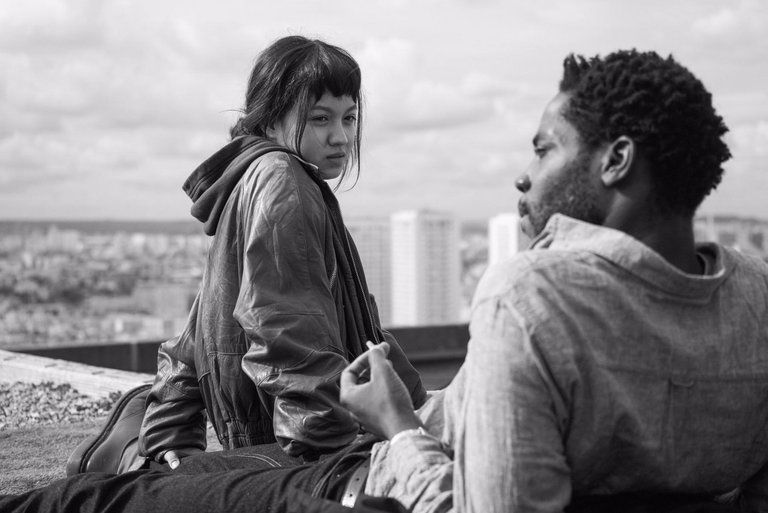
Later things get complicated when Camille meets first Stephanie and then Nora, women with whom she becomes emotionally and sexually involved without connecting with any of them and without definitively moving away from Émilie to whom she continues to turn - although it may seem strange - in seeking advice. We see Camille, Nora and Émilie looking for their personal, emotional and professional paths in the midst of a society that is not entirely comfortable for them.
Más adelante las cosas se complican cuando Camille conoce primero a Stephanie y luego a Nora, mujeres con las que se involucra emocional y sexualmente sin terminar de conectar con ninguna de ellas y sin alejarse definitivamente de Émilie a quien sigue acudiendo - aunque parezca extraño - en busca de consejo. Tanto a Camille, como a Nora y a Émilie, los vemos buscar sus caminos personales, emocionales y laborales en medio de una sociedad que no les es del todo cómoda.
Added to this is also the virtual relationship that Nora begins to have with Amber, a girl who works as a web model and with whom she begins to talk about different things until an unexpected complicity arises between them. Émilie with Camille, Camille with Stephanie, Camille with Nora, Nora with Amber, Émilie with countless casual lovers, relationships that don't fit into established labels, non-traditional sexual inclinations, a lot of sex (there is a large amount of nudity and sexual scenes throughout the film), the questioning of different things that can be good or bad, but are neither one nor the other but something in the middle of it all, are dating apps depressing? Is sex less important in this era? Frigidity, taboos, sexual pleasure, are themes that are treated in the film, but also the search for identity, grief, family, loneliness, migration, drugs, pornography... it's not a disclaimer, but the film reflects the same thing that many social studies have mentioned in recent years: love is a complex issue for millennials. Previous generations were more orthodox, perhaps very rigid, but the ideas and roles were clear. The younger generations feel great freedom when it comes to loving, naming and feeling. But, caught in the middle, millennials are something of a lost generation in terms of the search for love and themselves.
A ello también se suma la relación virtual que comienza a tener Nora con Amber, una chica que trabaja como modelo web y con quien comienza a conversar de diferentes cosas hasta que surge entre ellas una inesperada complicidad. Émilie con Camille, Camille con Stephanie, Camille con Nora, Nora con Amber, Émilie con innumerables amantes de ocasión, relaciones que no se encasillan en las etiquetas establecidas, inclinaciones sexuales no tradicionales, mucho sexo (hay una gran cantidad de desnudos y escenas sexuales a lo largo de la película), el cuestionamiento de diferentes cosas que pueden ser buenas o malas, pero que no son ni una ni otra sino algo en medio de todo ello, ¿son deprimentes las app de citas? ¿es menos importante el sexo en esta época? La frigidez, los tabúes, el placer sexual, son temas que son tratados en la película, pero también la búsqueda de la identidad, el duelo, la familia, la soledad, la migración, las drogas, la pornografía... no se trata de un disclaimer, pero la película refleja lo mismo que muchos estudios sociales han mencionado en los últimos años: el amor es un asunto complejo para los millennials. Las generaciones previas eran más ortodoxas, quizás muy rígidas, pero las ideas y los roles estaban claros. Las generaciones más jóvenes sienten una gran libertad a la hora de amar, de nombrar y de sentir. Pero, atrapados en medio, los millennials son una especie de generación perdida en términos de la búsqueda del amor.
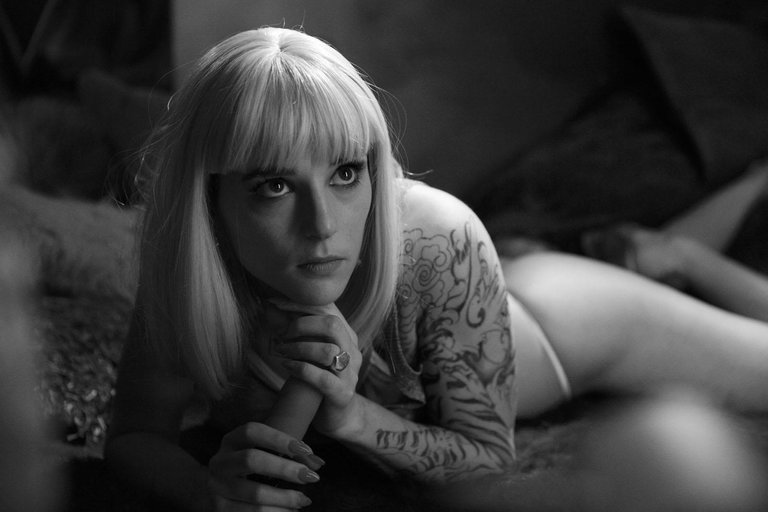
Today's thirty-somethings often seem to not know what they want or what they should want. If they want a traditional family, they are called backwards; If they don't wish to commit themselves, they are called cowards; and so on with other things, which generates the impression that precisely because they are at that inflection point between what was and what will be, they don't seem to be one thing or another.
Los treintañeros de hoy en día muchas veces parecen no saber qué quieren o que deben querer. Si quieren una familia tradicional, son tildados de retrógados; si no desean comprometerse, se les llama cobardes; y así sucesivamente con otras cosas, lo que genera la impresión de que precisamente por encontrarse en ese punto de inflexión entre lo que fue y lo que será, no parecen ser ni una cosa ni otra.
Erratic, confused, hurt, somewhat traumatized too, the characters of Paris, 13th District, all of them around the age of thirty, are a little adrift, doing the best they can with what they have to find some meaning in their life and in that search the love of a couple seems to play a very important role. I really liked the dynamics between the different characters, the way how sometimes the relationships between them cannot be named or labeled with a single name because they explore different territories at the same time and I really enjoyed the performances. Also, of course I really liked the photography, not only for the black and white aesthetic but also for the angles of certain shots. Something that caught my attention was that I found some sexual scenes between people with different skin tones very intense and beautiful. Camille has dark skin and when his body is shown intertwined with Nora's lighter skin, I feel that that contrast is enhanced with the black and white photograph in a way that it would not have been the same with a color photograph. It's those details, those little things that seem random to us - but certainly are not - that make us appreciate movies in a different way. Have any of you seen this film? I read you in the comments.
Erráticos, confundidos, heridos, algo traumados también, los personajes de Paris, 13th District, todos ellos con edades alrededor de los treinta años, van un poco a la deriva, haciendo lo mejor que pueden con lo que tienen para encontrarle algún sentido a su vida y en esa búsqueda el amor de pareja parece jugar un papel muy importante. Me gustó mucho la dinámica entre los diferentes personajes, la forma en cómo a veces las relaciones entre ellos no pueden ser nombradas o etiquetadas con un único nombre porque exploran diferentes territorios a la vez y disfruté mucho las actuaciones. Además, por supuesto que me gustó mucho la fotografía, no sólo por la estética en blanco y negro sino también por los ángulos de ciertas tomas. Algo que llamó mi atención fue que encontré muy intensas y bellas algunas escenas sexuales entre personas con diferentes tonos de piel. Camille tiene la piel oscura y cuando se muestra su cuerpo entrelazado con la piel más clara de Nora, siento que ese contraste se potencia con la fotografía en blanco y negro de una forma en que no habría resultado igual con una fotografía a color. Son esos detalles, esas pequeñas cosas que nos parecen azarosas - pero que sin duda no lo son - las que nos hacen apreciar las películas de una manera diferente, ¿alguno de ustedes ha visto esta cinta? Los leo en los comentarios.
Reseñado por @cristiancaicedo
Other posts that may interest you | Otros posts que pueden interesarte:
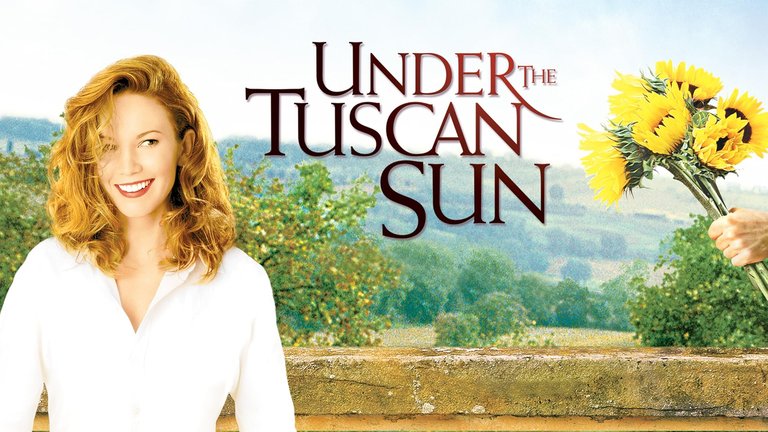 |
|---|
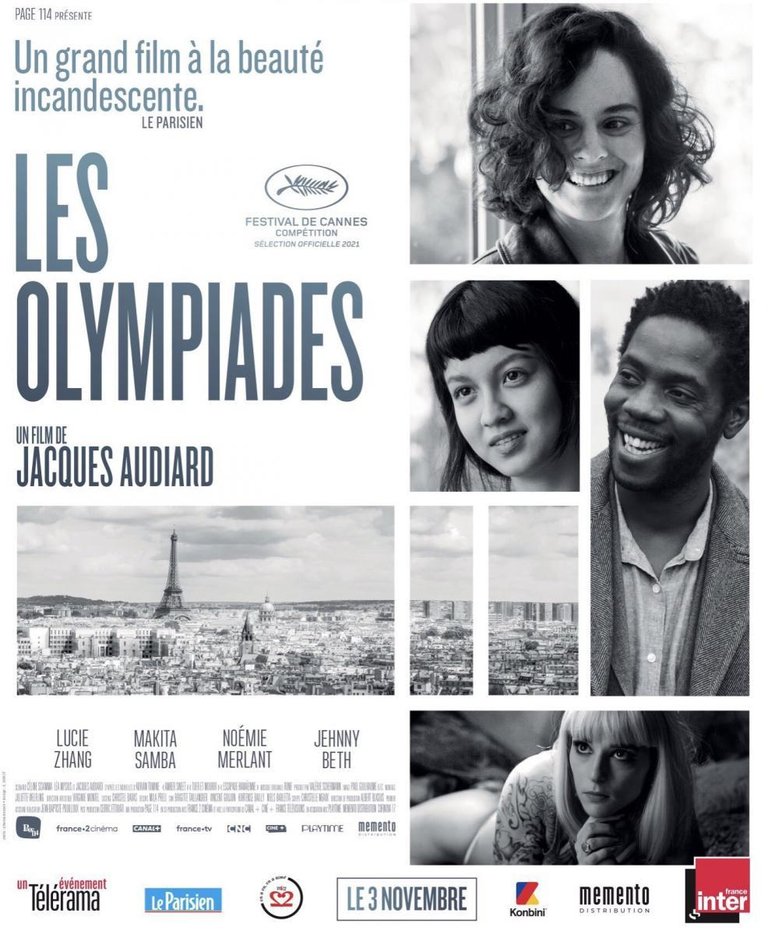
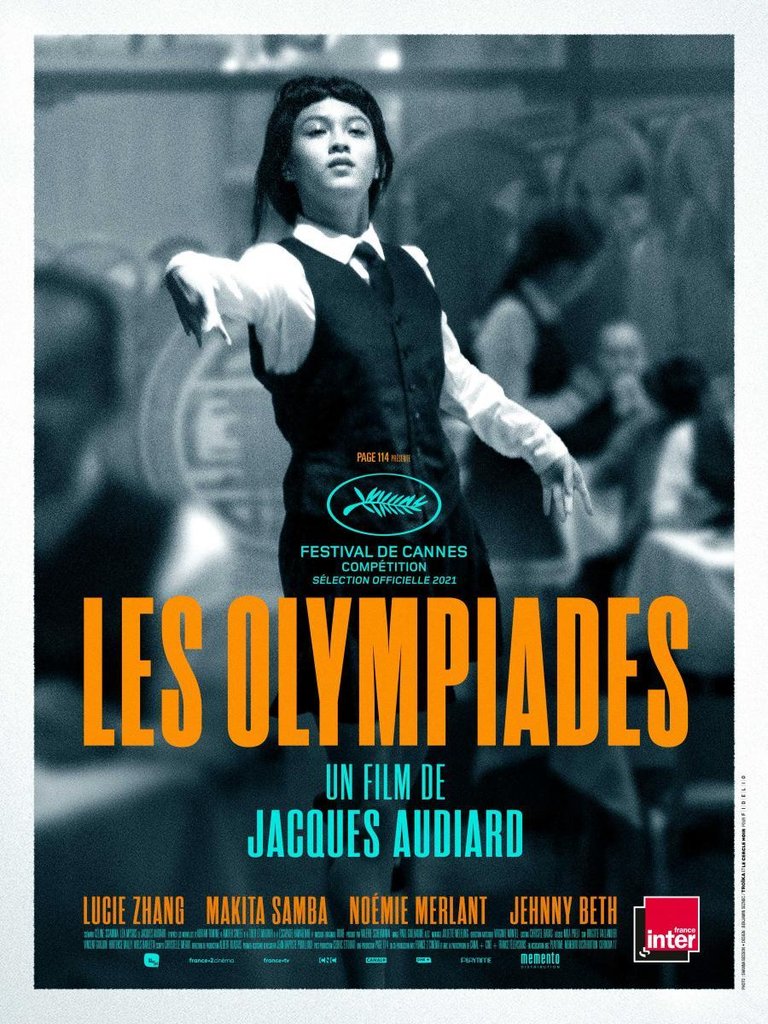
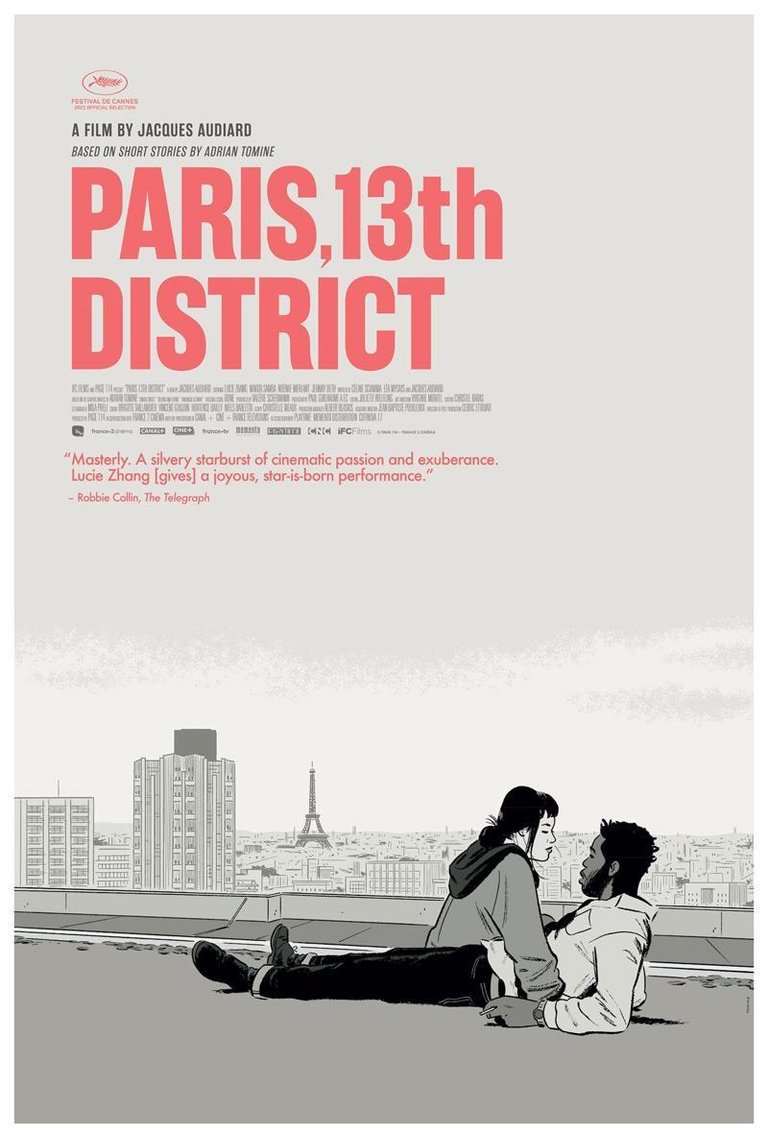
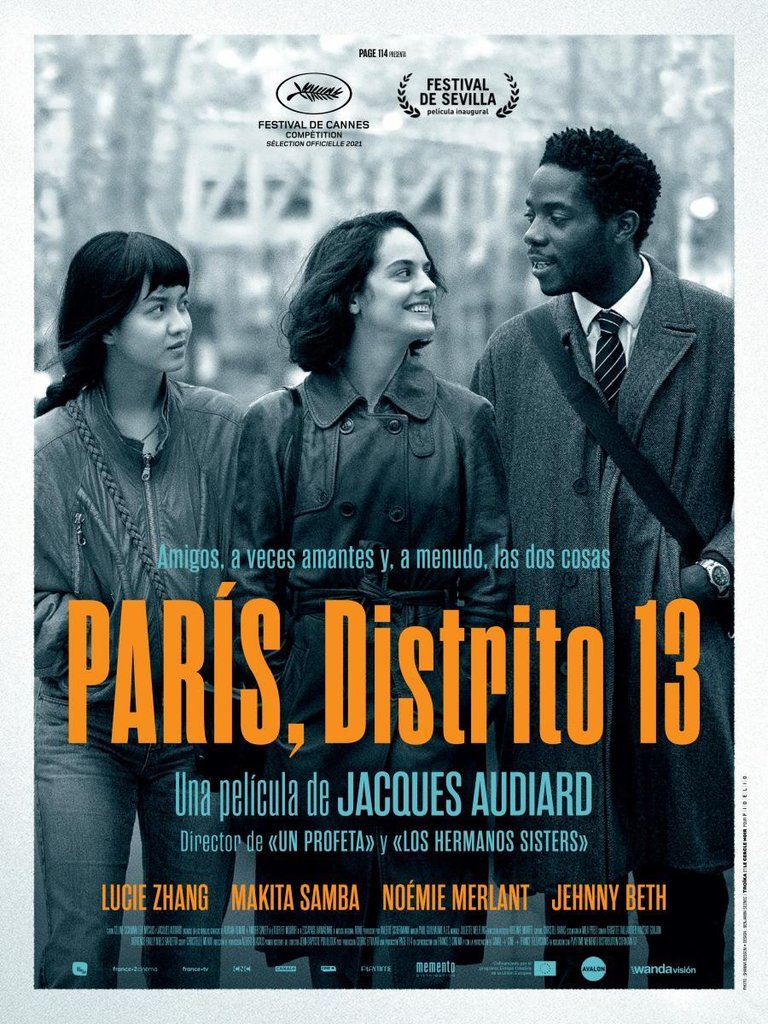
From Venezuela, our witness drives decentralization and the adoption of Web3 technology, creating opportunities for the local community and contributing to the global ecosystem. // Desde Venezuela, nuestro testigo impulsa la descentralización y la adopción de la tecnología Web3, generando oportunidades para la comunidad local y contribuyendo al ecosistema global.
Sigue, contacta y se parte del testigo en: // Follow, contact and be part of the witness in:
Agradecemos que nos ofrezcas la oportunidad de apreciar filmes como este con tus excelentes reseñas, @cristiancaicedo. Un filme que se muestra muy atractivo, con un acercamiento a esa generación (al parecer, ya hay otra u otras posteriores). Saludos, @cristiancaicedo.
Muchas gracias por el apoyo. Sí, hay varias sobre esta generación, me gustó mucho esta y The Worst Person In The World. Saludos
¡Felicidades! Esta publicación obtuvo upvote y fue compartido por @la-colmena, un proyecto de Curación Manual para la comunidad hispana de Hive que cuenta con el respaldo de @curie.
Si te gusta el trabajo que hacemos, te invitamos a darle tu voto a este comentario y a votar como testigo por La Colmena.
Si quieres saber más sobre nuestro proyecto, te invitamos a acompañarnos en nuestro servidor de Discord.
Congratulations @cristiancaicedo! You have completed the following achievement on the Hive blockchain And have been rewarded with New badge(s)
Your next target is to reach 200000 upvotes.
You can view your badges on your board and compare yourself to others in the Ranking
If you no longer want to receive notifications, reply to this comment with the word
STOPCheck out our last posts:
Black and white film when done right conveys more emotion than colored films. Just like how you said it with the character that has contrasting skin color, it makes them feel raw and symbolic.
That's true. Thank you so much for reading my post and leave a comment. Greetings.